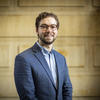Remembering the forgotten
In his current role with the Federal Reserve Bank of Atlanta, Sánchez is tasked with analyzing the economic impact of “benefit cliffs”—when families lose public assistance due to a career advancement, which actually causes them to be financially worse off than they were before.
Prior to accepting his Atlanta position, which he started in January 2022, Sánchez applied his skills at the Federal Reserve Bank of Philadelphia, where he produced applied economics papers on topics spanning equity, infrastructure, job creation and workforce development.
That’s where he conducted his most significant research to date—a study concerning broadband access and how it is limited for rural and low- and moderate-income communities, particularly in Pennsylvania. The first paper related to the research was published in early March 2020, and with the pandemic looming, it became even more important—and garnered media attention.
Driving his work always, Sánchez said, are the issues that surround “easily forgotten” low- and moderate-income communities.
“I am trying to solve the pervasive inequities related to poverty and economic insecurity, to put it in a nutshell,” he said.
A deep dive
Sánchez’s interest in research and data analysis was sparked early in his undergraduate career, when the saxophone-playing, former music education major undertook a study with the Department of Psychology’s Robert Weisberg about cognitive processes, creativity and jazz. For his efforts, he earned a Diamond Research Scholars Program award, which provided him with a stipend to support his research and came in handy during what he described as a financially rough time.
But one of his most transformational experiences, said Sánchez, was the opportunity to assist Laura H. Carnell Professor of Psychology Laurence Steinberg on a study investigating the long-term consequences of formal and informal processing on first-time juvenile offenders.
“My work with Dr. Weisberg showed me my love for researching, and the Steinberg study showed me that I really cared about social issues,” Sánchez said. “It was those two things that made me want to dive deeper into being a social scientist.”



